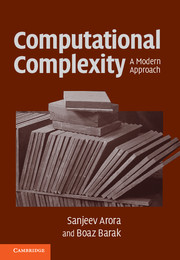Book contents
- Frontmatter
- Contents
- About this book
- Acknowledgments
- Introduction
- 0 Notational conventions
- PART ONE BASIC COMPLEXITY CLASSES
- 1 The computational model – and why it doesn't matter
- 2 NP and NP completeness
- 3 Diagonalization
- 4 Space complexity
- 5 The polynomial hierarchy and alternations
- 6 Boolean circuits
- 7 Randomized computation
- 8 Interactive proofs
- 9 Cryptography
- 10 Quantum computation
- 11 PCP theorem and hardness of approximation: An introduction
- PART TWO LOWER BOUNDS FOR CONCRETE COMPUTATIONAL MODELS
- PART THREE ADVANCED TOPICS
- Appendix: Mathematical background
- Hints and selected exercises
- Main theorems and definitions
- Bibliography
- Index
- Complexity class index
1 - The computational model – and why it doesn't matter
from PART ONE - BASIC COMPLEXITY CLASSES
Published online by Cambridge University Press: 05 June 2012
- Frontmatter
- Contents
- About this book
- Acknowledgments
- Introduction
- 0 Notational conventions
- PART ONE BASIC COMPLEXITY CLASSES
- 1 The computational model – and why it doesn't matter
- 2 NP and NP completeness
- 3 Diagonalization
- 4 Space complexity
- 5 The polynomial hierarchy and alternations
- 6 Boolean circuits
- 7 Randomized computation
- 8 Interactive proofs
- 9 Cryptography
- 10 Quantum computation
- 11 PCP theorem and hardness of approximation: An introduction
- PART TWO LOWER BOUNDS FOR CONCRETE COMPUTATIONAL MODELS
- PART THREE ADVANCED TOPICS
- Appendix: Mathematical background
- Hints and selected exercises
- Main theorems and definitions
- Bibliography
- Index
- Complexity class index
Summary
The idea behind digital computers may be explained by saying that these machines are intended to carry out any operations which could be done by a human computer. The human computer is supposed to be following fixed rules; he has no authority to deviate from them in any detail. We may suppose that these rules are supplied in a book, which is altered whenever he is put on to a new job. He has also an unlimited supply of paper on which he does his calculations.
– Alan Turing, 1950[Turing] has for the first time succeeded in giving an absolute definition of an interesting epistemological notion, i.e., one not depending on the formalism chosen.
– Kurt Gödel, 1946The problem of mathematically modeling computation may at first seem insurmountable: Throughout history people have been solving computational tasks using a wide variety of methods, ranging from intuition and “eureka” moments to mechanical devices such as abacus or sliderules to modern computers. Besides that, other organisms and systems in nature are also faced with and solve computational tasks every day using a bewildering array of mechanisms. How can you find a simple mathematical model that captures all of these ways to compute? The problem is even further exacerbated since in this book we are interested in issues of computational efficiency. Here, at first glance, it seems that we have to be very careful about our choice of a computational model, since even a kid knows that whether or not a new video game program is “efficiently computable” depends upon his computer's hardware.
Information
- Type
- Chapter
- Information
- Computational ComplexityA Modern Approach, pp. 9 - 37Publisher: Cambridge University PressPrint publication year: 2009
